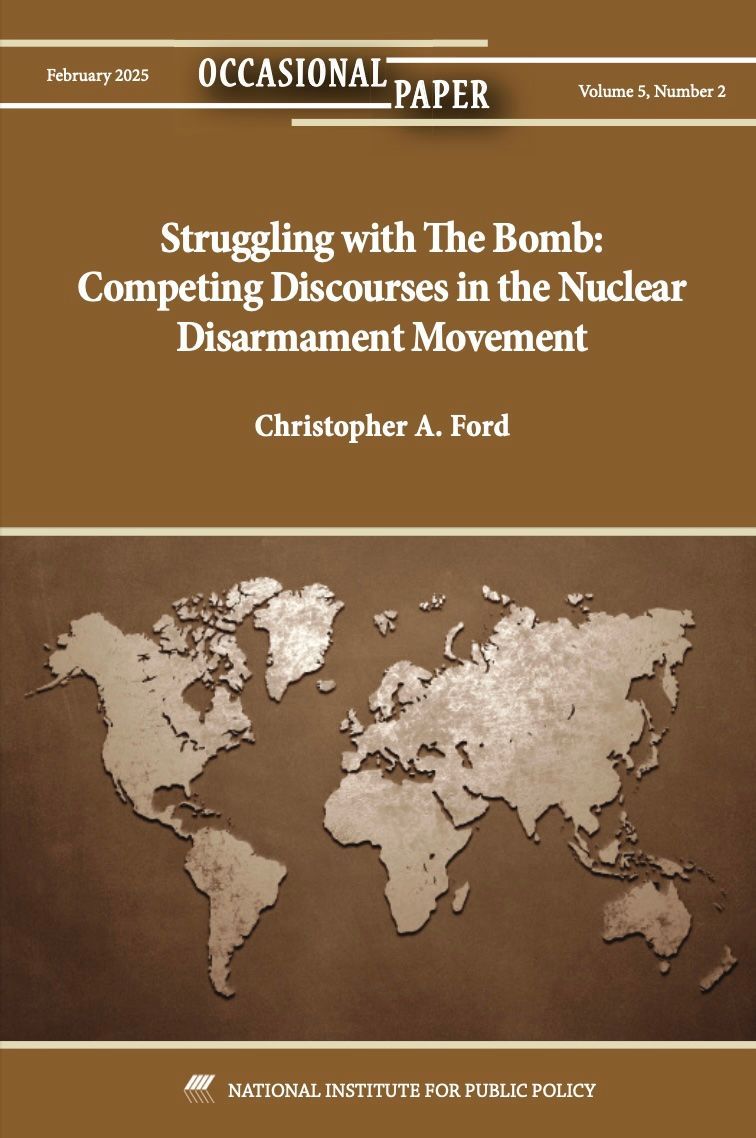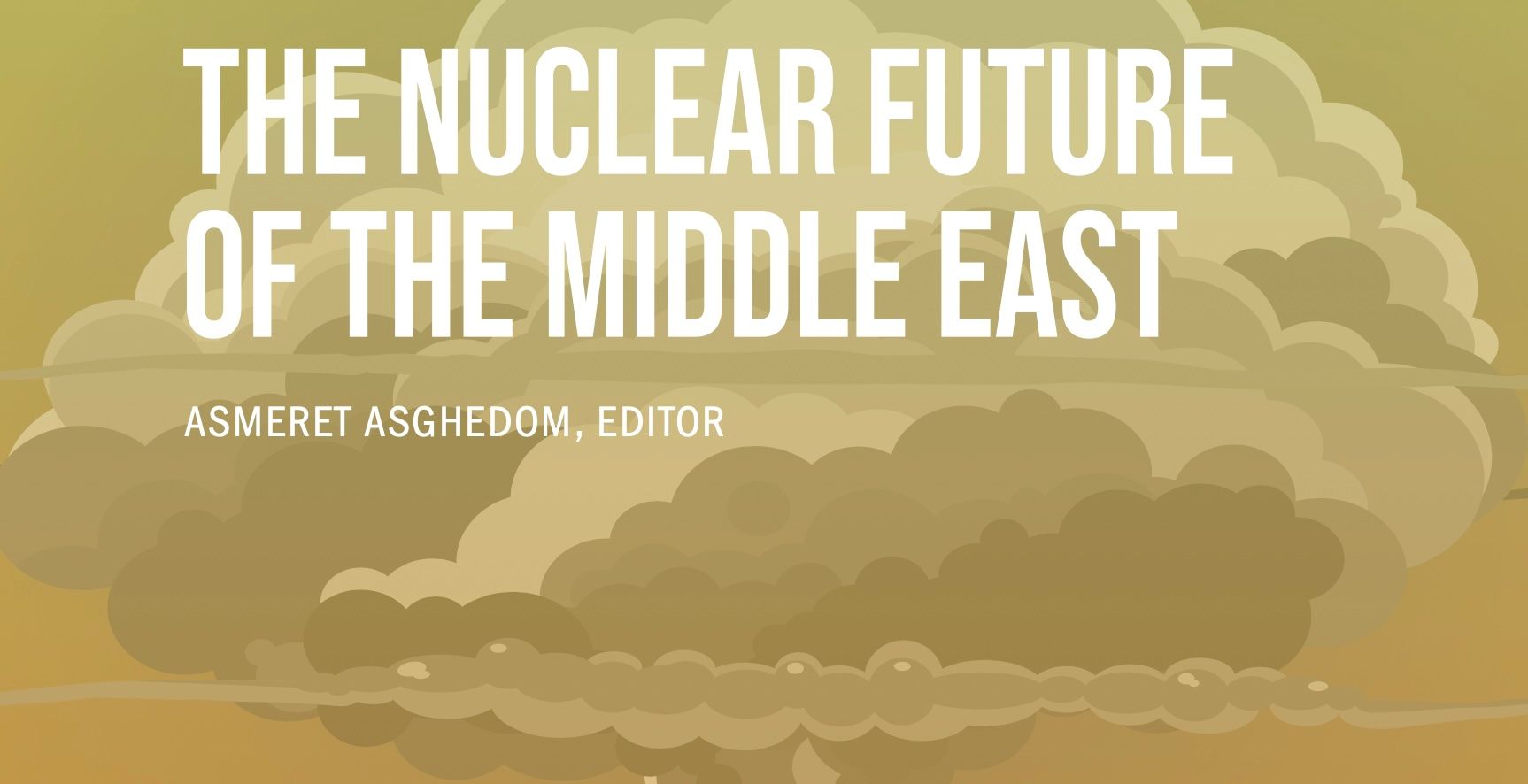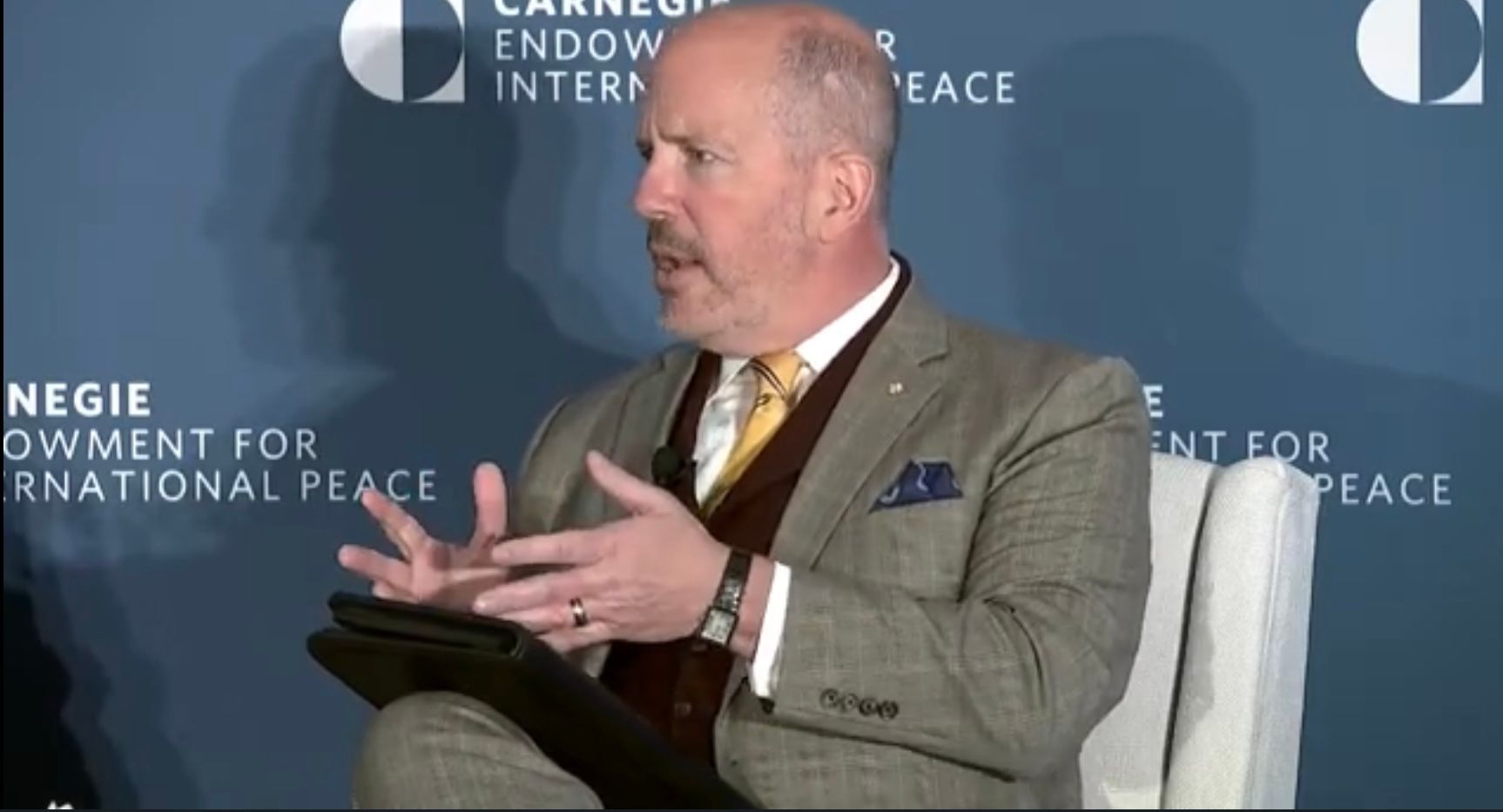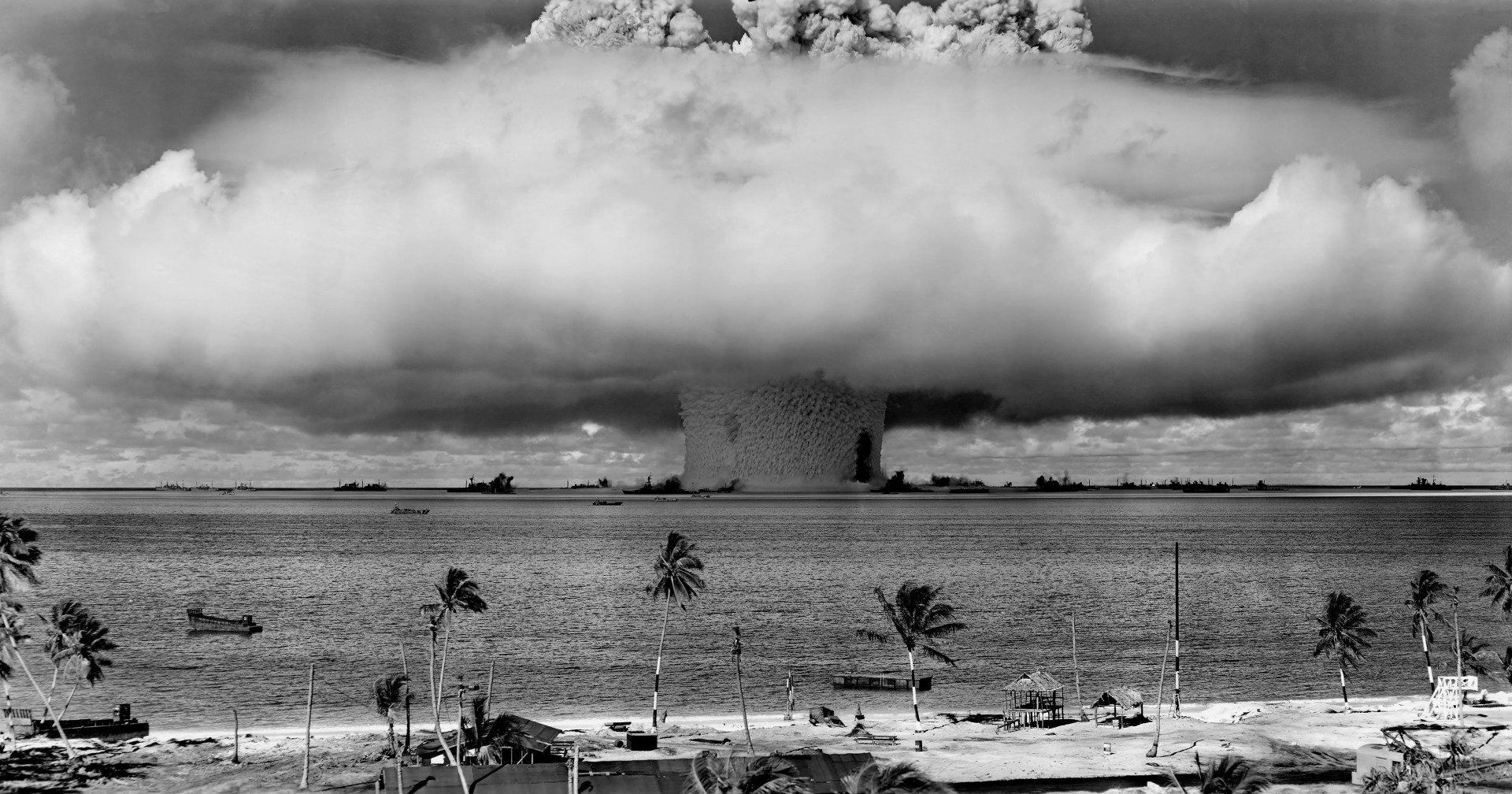The Dharma of Deterrence?
Dr. Christopher Ford • July 21, 2021
Below are the remarks Dr. Ford prepared for delivery to a meeting of the Members Circle at Zen Peacemakers International on July 20, 2021, subtitled as "A Zen Practitioner Reflects on Two Decades in the WMD World."
For my remarks, I have picked what I hope you’ll find to be an interesting topic, and what is surely an unusual one: my reflections as a Buddhist
on a career in the nuclear weapons and nuclear deterrence business. These are purely my own views, of course, and I wouldn’t dream of attributing them to anyone else. Nor do I expect that you’ll necessarily agree with my perspectives, for they are doubtless idiosyncratic. Nevertheless, I’m grateful for the chance to engage with such a thoughtful audience, and I look forward to our discussion.
I. The Contingency of Engagement with WMD
I should probably start by noting that I never actually set out
to get into the nuclear weapons business. If you had asked me 20 years ago what I was professionally, I would have told you I was a government oversight lawyer – or maybe, more specifically, an intelligence oversight lawyer. In those days I worked on Senate committee staffs, including doing legal oversight of the U.S. Intelligence Community when on the staff of the Select Committee on Intelligence. I was also then just beginning to identify as a Buddhist, having begun sitting with a Korean Zen (Soen) group across the Potomac in Alexandria, Virginia.
It was only in 2003 that the opportunity came along to move into the Executive Branch as a political appointee dealing with arms control and other nuclear weapons issues, but I’ve been eyebrow-deep in WMD policy issues ever since – and a Buddhist the whole time.
That combination has sometimes been confusing to my friends and colleagues, both the hawkish world of foreign and national security policy in two successive Republican presidential administrations, and in the Buddhist community, such as at the Upaya Zen Center where I graduated from its first chaplaincy program in 2010. So the combination may seem a bit weird, but I’ve long felt that unexpected juxtapositions can be great opportunities for both learning and for practice.
In chemistry, after all, interesting reactions don’t occur in the center
of a homogenous substance, but rather on its margins, where it abuts something different. Homogeneous “centers,” as it were, are pretty static, whereas boundaries are often catalytic – and certainly far more interesting! And what’s true of chemical substances, in this regard, is probably even more true of human cultures and sub-cultures. Conceptual and intellectual monocultures tend to be sterile, whereas boundary zones are where interactions and transformations occur.
And so, although I cannot speak either to what my work in the WMD business has meant to my Buddhist friends or to what my Buddhism has meant to my national security policy community colleagues, I think the very oddness
of being a Buddhist working on weapons of mass destruction issues has encouraged me to grapple with professional ethics – on a sort of industrial scale, as it were – in ways I probably would never have had to face otherwise.
II. The Challenge of Buddhist Policymaking
Anyway, in 2009, after leaving government that first time, I wrote an essay published by Upaya entitled “Nukes and the Vow: Security Strategy as Peacework.” In it, I stressed the challenge that I think is, for a Buddhist, inherent in any act of consequential choice-making: the problem of reconciling the objective of preventing or relieving suffering with the inescapability of the “not knowing” that the Zen Peacemakers have as their first of the Three Tenets.
Buddhist ethics strike me, at least, as being remarkably indeterminate when it comes to the complexities of operational decisions in the policy arena. Buddhist ethics may say a great deal about “where” you should be “coming from” in doing
policymaking – that is, one might say, where your heart is – but that’s not the same thing as prescribing exactly where you should be going
in terms of policy prescriptions. Ultimately, this is more “feature” than “bug,” I think, but I think it does demand a great deal of us by denying us easy, preordained answers.
Accentuating the point, the tenet of “not knowing” reminds us that rigid certainties are the “near-enemy” – that is, the dark shadow side – of insight. This seems to me to signal quite clearly that seeking and adhering to fixed and rigid answers to human problems is not “skillful means,” and that we surely fall into delusion and attachment if we presume that Buddhism confers upon us some kind of infallibility or dictates every specific policy outcome.
Yet while we must acknowledge our inability to have confidence in the results of our choices – or perhaps even in whether we’ve actually understood the real problem we need to solve – we also don’t have the luxury of not
making choices. Deliberate inaction, after all, is just another species of action that will most assuredly have consequences, and we are bound by the Bodhisattva Vow at least to try
to alleviate suffering, notwithstanding our fallibility.
For this reason, in the thesis I wrote for Upaya’s chaplaincy program, I described policy choice as being something of a koan
all in itself. We are bound by the Vow to try to alleviate suffering, but we are denied clarity about what will achieve that end, even as we are also denied the option of avoiding the question.
But whatever the nature of the dilemma, it seems to leave us in a difficult spot. What is a policymaker to do? And how, I wondered, can one bring this into the arena of nuclear weapons policy, of all things?
III. The Vision of “Nukes and the Vow”
My tentative answers may or may not persuade you, but I tried to come at the issue of nuclear weapons by at least aiming to get the objective
straight and to try to ask the right questions
– however hard it might be to figure out, in practice, how to achieve it or answer them. Notably, and in a break with the dominant strain of previous disarmament discourse, I didn’t
start with the assumption that the primary objective was to eliminate all nuclear weapons. That
specific a policy conclusion, I felt, was a certainty that the First Tenet – “not knowing” – more or less precluded.
Rather, I tried to start by focusing upon an antecedent assumption, and one about which we perhaps can
have reasonable certainty simply on the basis of our very Buddhism itself: the fact that the overriding objective is to create a world that contains as little human suffering as possible. As I put it in 2009,
“Whatever else it might mean for a Mahayana Buddhist to seek, through social action, to create conditions maximally conducive to the enlightenment of other sentient beings, it presumably includes working to ensure a relatively stable global security environment. To put it rather bloodlessly, people who are being slaughtered probably face significant constraints upon their capacity for spiritual practice. … The compassionate objective is to prevent or alleviate suffering as Buddhists understand this term: we seek a future world structured so as to offer ever better opportunities for humans to overcome samsaric confusion and attachment.”
This conceptual prism essentially made the “What to do about nukes?” question into a secondary
one:
“If it could be shown conclusively that the existence of nuclear weapons inherently inhibits spiritual progress – and that a world containing such weapons is intrinsically more enlightenment-inhibiting than any imaginable world without them – then a good Buddhist would surely have to be their implacable foe. … [Yet] [f]rom the perspective of Buddhist compassion, some global security environments without nuclear weapons are surely less desirable than some scenarios that contain them. …
“We must remember that peace and security is the public policy objective, not nuclear disarmament per se. Weapons elimination is just one possible upaya [or ‘skillful means’], to be used or discarded depending upon its contribution to the goal. To treat it as an axiom that no stable and enlightenment-facilitating future world could possibly contain any nuclear weapons seems to me a form of delusive knowing. I am no more willing simply to assume the necessity of eliminating such weapons than I am to assume the imperative of keeping them. …
“If a disarmed world cannot be made reasonably secure against large-scale conventional conflict and against ‘breakout’ by countries seeking nuclear weapons, for example, such a nuclear weapons-free world should not necessarily be preferred to today’s world – in which there has not been a full-blown Great Power war for many decades, and in which [nuclear] proliferation still faces at least some constraints. And an insecure world free of nuclear weapons should surely not be preferred to a future world in which such weapons continue to exist, but in which possessors have only quite small arsenals and have reduced the salience of nuclear weapons in their defense planning, in which limited missile defenses and early-warning data-sharing help reduce the risk from proliferation and from false alarms, in which nonproliferation obligations have become universal, proliferation-facilitating technologies are carefully controlled, and violations are deterred by a high probability of swift negative consequences, and in which all major weapons-possessors benefit from some kind of general transparency and confidence-building treaty regime.”
“In Buddhist peacework,” I felt, “our lodestar should be fundamental human security, rather than the talismanic presence or absence of nuclear devices per se.” It is this emphasis that led me to engage seriously with nuclear deterrence, with questions of whether and under what circumstances it was even possible
to envision real-world possessors being willing to give up their weapons in the first place, and with how to make the world as conducive as possible to the prevention and alleviation of suffering in the event that – or for so long as – such possessors did not eliminate these weapons.
IV. Disarmament and Security
In effect, therefore, this emphasis plunged me – not just as an “Inside the Beltway” Washington policy wonk, but actually as a Buddhist
– into complex and messy questions of international security policy. Such matters are fundamentally contested, contingent, fraught, ambiguous, and complicated. They are about how to manage and shape the risks and challenges inherent in a multi-player environment of power, competition, bureaucracy, technology, emotion, ambition, and politics.
Yet these were not usually the sort of things one saw the disarmament community even trying
to address. Nevertheless, I felt that struggling with the complexity of security
was essential to the greater project of Buddhist peacework, and that we could scarcely hope to ensure a more genuinely peaceful world without grappling with such things.
This was also a theme that I tried to address in a second 2009 essay, in which I urged the disarmament community to “learn to speak disarmament in the language of security” if they wished to create foundations for possible progress in arms reduction and toward eventual nuclear weapons elimination. In that essay, I urged that all stakeholders begin a dialogue on how it might be possible to start creating real-world security conditions more conducive to disarmament progress.
I hoped that this approach would have appeal both to disarmament advocates and to disarmament skeptics. “Only by being able to answer the toughest of questions,” I felt, would the disarmament community “be able to make a persuasive case for disarmament in a language intelligible to the real-world decision-makers who sit atop the national security bureaucracies of the weapons states.” At the same time, I hoped that disarmament skeptics would recognize “that it was also in their interest to engage on disarmament in a serious dialogue,” for if these skeptics were right “that ‘zero’ was either undesirable or simply impossible, a serious dialogue would help this become more apparent.”
So why not, I argued, build such a dialogue in order to “catalyze serious discussions about the sorts of circumstances it might be necessary to create in order to make nuclear weapons abolition a plausible and saleable policy choice” for nuclear weapons possessors?
It wasn’t that I felt I knew the answers, of course. Far from it. But it did seem clear to me that global peacework would be doomed to failure if we weren’t at least asking such questions. As I put it at the time in “Nukes and the Vow,” “[i]f there is to be a chance for ‘zero,’ it surely lies in and through the dynamics and complications of political life, not in some vain hope of a miraculous transcendence.”
We might have a lot of work ahead of us in wrestling with these questions without clear answers being apparent ahead of time, in other words, but I felt like Buddhism functioned here as a call to practice
in such wrestling. And if both sides of the nuclear weapons debate could at least temporarily put aside their respective “knowings,” valuable learning might yet be possible along the way – including about how it might be possible to ameliorate at least some
of the armament pressures created by a challenging global security environment. And if the disarmament community really could
learn to “speak disarmament” persuasively in a language of security intelligible to real-world leaders, who knew what might eventually be possible?
V. The Diplomacy of Engagement
Anyway, that was how things seemed to me as I transitioned from the State Department into the think tank world while bouncing back and forth to New Mexico for the chaplaincy training program under Roshi Joan at Upaya. So how do I think this vision has fared in the intervening years?
Well, somewhat to my surprise, I think the answer is “not too badly.” After I was appointed to serve as Special Assistant to the President and run the Weapons of Mass Destruction and Counterproliferation Directorate at the U.S. National Security Council in 2017, we undertook what I called a “nuclear vision review” to look at U.S. disarmament policy with fresh eyes. Our conclusion? That the approaches to nuclear disarmament that had become the conventional wisdom since the end of the Cold War had run out of steam.
It had
been possible to make significant disarmament progress after the Cold War ended, of course, since neither Washington nor Moscow thereafter felt that they needed the huge arsenals that both had amassed during their period of strategic rivalry. The easing of tension and strengthening of trust between the two superpowers at the end of the 1980s and in the early 1990s thus made possible enormous disarmament progress in the form of huge
nuclear reductions – to the point that the current size of the U.S. nuclear arsenal, for instance, is only about ten percent of its Cold War peak, and the smallest since the Eisenhower era.
But with such weapon surplusages having now been eliminated and the security environment not
improving further – and, in fact, now worsening
– post-Cold War disarmament approaches have stopped producing results. Our conclusion was that those approaches simply couldn’t
work any more because they had run up against the internal contradiction of their assumption that pushing for disarmament agreements would produce lessened security tensions, rather than the other way around.
As I put it in a speech to the Ploughshares Fund in late 2017
when explaining the results of our review, the disarmament community’s traditional approach “hasn’t worked, and probably couldn’t
have done so because it focused too much upon the weapons rather than upon the actual conditions under which so many countries clearly still feel the need to have such weapons.” We thus clearly needed new thinking.
To our eye, what was really needed was “a wisdom that has been hiding in plain sight all along” – namely, the insight that if you want to facilitate disarmament, you need to ease tensions and strengthen trust between states, thus making it more and more possible for national leaders to conclude that they need nuclear weaponry less and less. “If there exists a viable road to disarmament in the current security environment,” I told Ploughshares,
“… it surely must run through the amelioration of such adverse geopolitical conditions. If we can successfully address those conflicts and rivalries, reducing or even eliminating the weapons themselves may be possible; if we cannot, it’s hard to see how any weapons-focused agenda could succeed.”
Echoing my 2009 essay on the topic, the 2017 U.S. “nuclear vision review” emphasized that “friends of disarmament need to take the time to learn to ‘speak’ the security ‘languages’ of contemporary weapons possessors,” and should “prize deep engagement” on the question of what conditions in the security environment would actually facilitate disarmament.
The upshot of these conclusions was that – after I moved to the State Department at the beginning of 2018 – we led the U.S. Government in undertaking a new disarmament dialogue initiative that focused precisely upon this question. We came to call this the “Creating the Environment for Nuclear Disarmament” initiative, or CEND.
Over the next three years, CEND pulled together a remarkably diverse coalition of 42 countries and a handful of non-governmental organization (NGO) facilitators. As I pointed out afterwards, the states that assembled at the first CEND plenary in Washington, D.C., in 2019 represented
“a wide range of diverse countries — nuclear weapons possessors and non-possessors, industrialized and developing nations, nuclear alliance members and ‘Ban Treaty’ adherents, and key players from both sides of political and ideological fault lines in the Middle East, South Asia, Europe, and East Asia alike .…”
This fantastic range of participants “sent the signal that there are many out there who would like to find viable answers to the problems of disarmament, and who recognize that traditional approaches weren’t providing what the world needs.”
More importantly, these CEND participants set out to explore what the world really does
need in order to facilitate further disarmament progress. By the time I left office in January 2021, CEND had progressed from its “planning” phase to the point of actually seeing three working groups begin deliberations of three sets of questions
that participants had identified as being critical as they prepared terms of reference for the CEND work program. These three questions were as follows:
- What incentives affect countries’ decisions to possess or to eliminate nuclear weapons, and how might one change those incentives?
- What mechanisms can bolster nonproliferation and disarmament, and might help make disarmament more sustainable once it has been achieved? and
- How should we manage and reduce nuclear risks until such point as nuclear weapons are eliminated?
I do not know whether the Biden Administration has yet officially picked up this baton we left them, but my informal contacts with officials still in the government suggest that the new team will indeed continue forward with the CEND project we created. I wish the participants Godspeed, and hope that their deliberations will produce security-focused insights that can help make the world a safer place, and that will perhaps even help point the way to safe and sustainable disarmament progress in the years ahead.
VI. The
Koan of Buddhist Engagement
So what, then, does this all mean from the perspective of Buddhist peacework in the fraught arena of weapons of mass destruction policy?
For me, one key is about the importance of dialogue and engagement, even with – and indeed perhaps especially
with – those who disagree with you, provided at least that all parties bring some degree of good faith to the table. Such dialogue is no guarantee of substantive success in alleviating suffering, of course, but in a complex world of interacting stakeholders with formidable capabilities and very different interests and perspectives, it seems to me that one will certainly fail without it.
Another lesson, I think, is that there is no necessary contradiction between Buddhist peacework and hard-nosed security politics, including nuclear deterrence. There is a stereotype of Buddhism – in the West, at least, especially amongst converts – that paints it as adamantly pacifistic and steadfastly anti-nuclear. I suspect, however, that we cannot fulfil the Bodhisattva Vow or live up to the First Tenet if we allow ourselves to be stuck in the “knowing” of such rigidities.
There is no way one could hope to answer
the problems of security – including those of deterring aggression, not least in the nuclear arena – without being willing to take security seriously and to engage with the issues and complications that security raises. The Buddhist should do this with compassion in his or her heart, with an open mind, and with good faith, of course. Nevertheless, we will betray our own ameliorative ideals if we do not address security at least in part on its own terms. Such thoughtful engagement is skillful means (upaya), whereas confronting leaders who face security dilemmas merely with moralistic ultimata to ignore those concerns and take steps they feel will imperil them and the societies they represent is, at the most charitable, unskillful
– and surely unhelpful.
Furthermore, in keeping with the First Tenet, I think we need to acknowledge that there aren’t
many clear and obvious answers to the various security challenges faced by countries struggling with the world’s nuclear weapons policy problems. If there were, I suppose, there’d be less point in dialogue, and policymaking would be merely a question of browbeating everyone else into agreement with the Revealed Truth. Buddhism, however, denies us the lazy luxury of assuming that we already know all the answers and that no genuinely difficult decisions remain for us to make.
It is certainly not obvious how to be a good Buddhist and to conduct effective statecraft at the same time. Nevertheless, if one is lucky enough to have the opportunity to make decisions of consequence for the greater good, one must seek to do both of these things.
Perhaps we can learn at least something in this respect from pre-Communist Tibet, where officials confronted these dilemmas in acute forms. Significantly, perhaps, the “last testament” of HH the 13th Dalai Lama (1876-1933) included the exhortation that
“[o]ur political stability depends on the devotion of the ecclesiastic and secular officials and upon their ability to employ skillfully every diplomatic and military means without any possibility of regret or failure.”
His Holiness did not presume to lay down specific concrete commandments for his successor and for the Tibetan government, but instead exhorted them to statecraft as a Buddhist practice. The “skillful means” or upaya
he envisioned, moreover, clearly included both diplomacy and potentially even military action, where and when this might be needed to defend the country from external threats.
And, as we all remember, these challenges became ever more acute for Tibet after his death, up until the point of Communist Chinese invasion and subsequent efforts by Beijing to destroy the cultural integrity of Tibetan Buddhism and to suppress and destroy the national identity of Tibet and crush the civil and human rights of the Tibetan people. In response to this
challenge, in the extreme circumstances of Tibet’s conquest in 1959, HH the 14th Dalai Lama took a similar position.
As recounted by by Tsipon Shuguba – a former high official in the Tibetan government up until the end, who was imprisoned for a long time by the Chinese thereafter – as Chinese Communist troops advanced, the collapsing Tibetan government sought advice from the 14th Dalai Lama after his escape to exile in India. According to Shuguba, on March 18, 1959, a letter arrived from His Holiness providing guidance, but it did not purport to give clear instructions other than
to exhort Tibetan officials to grapple open-heartedly with the dilemmas of statecraft they faced.
The Dalai Lama urged key remaining Tibetan government officials to take up positions as generals – generals, mind you! – and to attempt to negotiate with the Chinese to preserve Tibet’s freedom. This signaled that they did not have the option of refusing
to engage with the statecraft and security challenges of their moment. Yet “if the Chinese refused to negotiate,” Shuguba recounts His Holiness directing only that
“we must deliberate profoundly amongst ourselves and come to an agreement about whether to fight or to use other methods of resistance. The Dalai Lama said he would pray for us unceasingly, but we would be unable to communicate further. It was left to us to decide on a peaceful or a wrathful solution.”
And there, in His Holiness’ own words, we have the awesome challenge of statecraft and security through the prism of compassionate Engagement.
In the dissertation I wrote in 2010 for the Upaya Zen Center chaplaincy program, I referred to this kind of challenge as the koan
of policy choice. Our koan
is, in effect, the challenge of reconciling not knowing
with the day-to-day requirements of advocating, implementing, and defending particular policy choices against alternative courses of action, and in a context both in which one cannot avoid choice and in which any choice will have very significant consequences.
This is heavy stuff, especially if your line of work is dealing with geopolitical conflicts and the policy implications of technologies that could potentially destroy human civilization. Nevertheless, I think there is no alternative to throwing ourselves headlong into such engagement: we need to embrace these dilemmas as among the most important that there are or could be, and we must not shirk them.
Where this ends up taking us, I cannot pretend to know. But I do think these challenges are surpassingly important, and that we humans will both suffer less and thrive more to the degree that we can bring a thoughtful, mindful, compassionate, and security-informed mindset to wrestling with such problems.
Thanks for listening.
-- Christopher Ford

The National Institute for Public Policy (NIPP) published Dr. Ford's paper " Struggling with The Bomb: Competing Discourses in the Nuclear Disarmament Movement" in February 2025, as the second paper in Volume 5 of its Occasional Papers series. You can find Dr. Ford's paper on NIPP's website here , or use the button below to download a PDF.
Dr. Ford and Lord Nigel Biggar published their essay on " Rebutting Sino-Russian Political Discourse and Getting Rights Right" in the Winter 2025 issue of Defense & Strategic Studies Online (DASSO). You can find the DASSO homepage here , read the full second issue of DASSO here , access the Ford/Biggar essay online here , or use the button below to download a PDF of the essay.

On February 6, 2025, the Center for Global Security Research at the Lawrence Livermore National Laboratory published a new edited volume on nuclear weapons challenges in the Middle East. Dr. Ford's paper "Snapping Back and Looking Forward: A New Old Approach to the Iran Nuclear Crisis" appears in that volume. You can find the whole book on CGSR's website here , or use the button below to download Dr. Ford's chapter.






